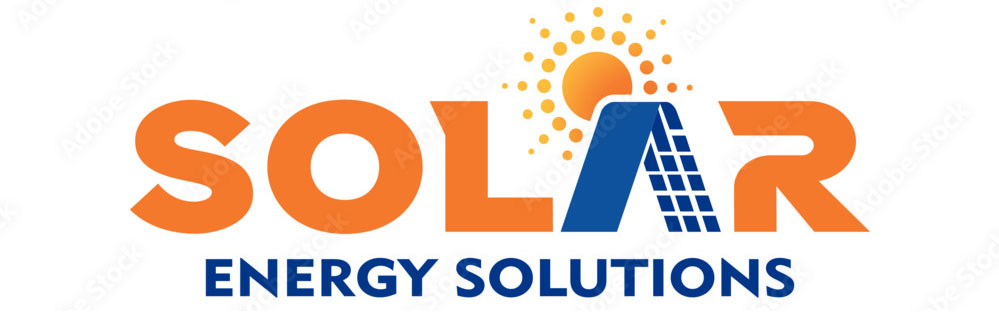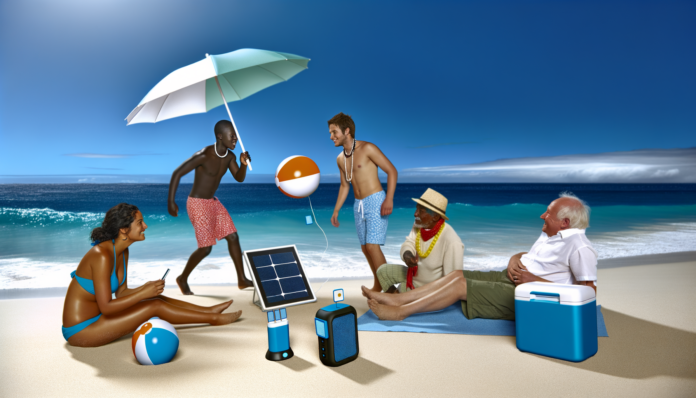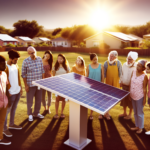Introduction to Sustainable Seaside Fun
The rising popularity of eco-friendly beach activities
As the collective consciousness about environmental preservation grows, so does the interest in eco-friendly beach activities. Beachgoers are increasingly seeking out sustainable options that minimize their ecological footprint while maximizing seaside enjoyment. From using biodegradable sunscreen to participating in beach clean-ups, the trend towards green recreation is evident. Stores like Third Coast Beach Co. in Port Aransas, Texas, have observed a steady demand for products that cater to this eco-conscious audience, including items like UPF+50 beach shades recommended by The Skin Cancer Foundation.
Understanding the impact of solar power on outdoor recreation
Solar power is revolutionizing outdoor recreation by providing a clean, renewable source of energy for a variety of beach activities. Innovative companies are integrating solar technology into traditional beach gear, offering products like solar-powered USB charging ports that attach to beach umbrellas. This not only enhances the beach experience by keeping devices charged but also reduces reliance on non-renewable energy sources, making a day at the seaside more sustainable.
The intersection of sustainability and leisure
The fusion of sustainability and leisure is a growing trend that reflects a broader societal shift towards environmentally responsible living. Beachgoers no longer have to choose between convenience and eco-friendliness; they can enjoy the best of both worlds. Products like the Neso beach shade, which is portable and lightweight, offer sun protection while being easy to set up, embodying the seamless integration of sustainability into leisure activities.
Overview of solar gear for beach activities
The market for solar gear suitable for beach activities is expanding, with a variety of products available to enhance the seaside experience. These range from solar-powered charging stations for devices, ensuring that beachgoers stay connected, to solar coolers that keep refreshments chilled without the need for ice. Solar lighting solutions extend the fun into the evening, and even water sports equipment is beginning to incorporate solar technology. With the added benefits of reducing carbon footprints and promoting energy independence, solar gear is set to become a staple for beach enthusiasts who prioritize sustainability.
The Essentials of Solar Gear for Beachgoers
Criteria for Selecting Solar Gear for Beach Activities
When choosing solar gear for beach activities, several factors should be considered to ensure both functionality and sustainability. Durability is paramount, as beach conditions can be harsh with saltwater, sand, and sun exposure. Efficiency of the solar panels is also crucial; they should be capable of charging devices or powering equipment within a reasonable time frame. Portability is another key aspect, as gear should be lightweight and easy to transport. Lastly, water-resistance is a must for any beach-bound equipment to protect against accidental splashes or high humidity.
The Role of Solar Power in Enhancing Beach Experiences
Solar power plays a significant role in enhancing beach experiences by providing a renewable source of energy that can power a variety of devices and amenities without the need for traditional electricity. This can include charging phones, powering portable coolers, or even running a sound system for music. The use of solar power also contributes to a cleaner environment by reducing the carbon footprint associated with recreational activities.
Comparing Traditional Beach Gear with Solar Alternatives
Traditional beach gear often relies on disposable batteries or non-renewable energy sources, which can be both inconvenient and environmentally harmful. Solar alternatives, on the other hand, offer a greener solution by harnessing the sun’s energy. For example, a solar-powered charger eliminates the need for disposable batteries, while a solar beach umbrella can provide shade while also charging your devices. These solar alternatives not only reduce waste but also offer enhanced convenience and self-sufficiency for beachgoers.
Maintenance and Longevity of Solar Beach Equipment
The maintenance of solar beach equipment is generally minimal, often requiring only regular cleaning to ensure the panels are free from sand and salt residue. However, it is important to consider the quality of materials used in solar gear to ensure longevity. High-quality, UV-resistant materials can withstand the rigors of the beach environment, ensuring that your investment continues to pay off over time. Additionally, proper storage and care when not in use can greatly extend the life of solar beach gear.
Innovative Solar Gear Categories
Solar-powered Charging Stations for Devices
As beachgoers increasingly bring their electronic devices to the seaside, the need for charging solutions has become apparent. Innovative solar-powered charging stations are now a common sight on many beaches. These stations harness the power of the sun to provide a renewable source of energy, allowing visitors to recharge their smartphones, tablets, and other USB-powered devices. Not only do they offer convenience, but they also encourage the use of clean energy over traditional fossil fuels.
Portable Solar Panels and Power Banks
For those who prefer a more personal and portable option, solar panels and power banks are the perfect companions for a day at the beach. Lightweight and foldable solar panels can be easily packed and set up to capture solar energy, which is then stored in power banks for later use. This ensures that beachgoers can keep their devices powered throughout the day without relying on fixed infrastructure or leaving a carbon footprint.
Solar-powered Coolers and Refrigeration
Keeping drinks and snacks chilled on a hot day is now more eco-friendly with solar-powered coolers. These coolers use solar panels to power a refrigeration system, eliminating the need for ice packs or electricity from the grid. Some models even come with additional features like built-in Bluetooth speakers, making them a multifunctional addition to any beach setup.
Solar Lighting Solutions for Evening Beach Activities
As the sun sets, solar lighting solutions can illuminate the beach for continued fun into the evening. Solar-powered lanterns, string lights, and pathway markers provide a warm glow, enhancing the ambiance while ensuring safety and visibility. These lights store solar energy during the day and automatically turn on at dusk, offering a sustainable alternative to traditional battery-powered or electric lights.
Water Sports Equipment with Solar Technology
The integration of solar technology into water sports equipment is a game-changer for enthusiasts. For instance, solar-powered surfboards and kayaks come equipped with solar panels that power small electric motors, providing assistance when paddling out or cruising along the water. This not only adds a new dimension to the sport but also promotes the use of renewable energy sources.
In conclusion, the range of solar gear available for beach activities is constantly expanding, offering sustainable and innovative solutions for environmentally conscious beachgoers. From charging stations to coolers and lighting, solar technology is enhancing the beach experience while preserving the natural beauty of our seaside environments.
Benefits of Solar Gear for the Environment and Users
Reducing Carbon Footprint with Solar Beach Gear
One of the most significant advantages of solar beach gear is its ability to reduce the carbon footprint associated with seaside activities. Traditional beach equipment often relies on non-renewable energy sources that contribute to greenhouse gas emissions. Solar-powered alternatives harness the sun’s energy, a clean and inexhaustible resource, to power everything from portable speakers to sun umbrellas with built-in charging stations. By opting for solar gear, beachgoers can enjoy their leisure time while contributing to a healthier planet.
Cost Savings and Energy Independence
Investing in solar beach gear can lead to substantial cost savings over time. While the initial purchase may be higher than conventional equipment, solar gear eliminates the ongoing expense of batteries or external power sources. Moreover, it provides energy independence, as users are not reliant on grid power and can generate their own electricity to power devices, lights, and other beach essentials. This self-sufficiency is not only economical but also ensures uninterrupted fun, even in remote or off-grid beach locations.
Enhancing Outdoor Safety and Convenience
Solar gear enhances outdoor safety and convenience for beachgoers. Solar-powered lights can illuminate pathways or campsites, reducing the risk of accidents after sunset. Solar chargers ensure that communication devices remain powered, which is crucial for emergency situations. Additionally, solar-powered coolers can keep food and beverages at safe temperatures, preventing spoilage and foodborne illnesses. These innovations offer peace of mind, allowing users to focus on relaxation and recreation.
Promoting Sustainable Tourism and Local Economies
The adoption of solar gear at beaches can also play a pivotal role in promoting sustainable tourism. Tourists are increasingly seeking eco-friendly travel options, and destinations that offer solar-powered amenities can attract this growing market. This shift not only helps protect the environment but can also bolster local economies. When beach vendors and rental services integrate solar products into their offerings, they tap into the eco-conscious consumer base, potentially increasing revenue and encouraging sustainable business practices.
In conclusion, the benefits of solar gear for beach activities extend far beyond individual convenience. By choosing solar-powered options, beachgoers contribute to a larger movement towards sustainability, supporting environmental health, economic savings, safety enhancements, and the growth of eco-friendly tourism. As society becomes more aware of the impacts of their recreational choices, solar beach gear stands out as a shining example of how innovation can align with environmental stewardship for a brighter, cleaner future.
Challenges and Considerations
Weather dependency and geographic limitations
One of the primary challenges of using solar gear at the beach is its inherent dependency on weather conditions. Solar panels and chargers require direct sunlight to function efficiently, which can be problematic on overcast or stormy days. Additionally, the effectiveness of solar gear can vary significantly based on geographic location. Beaches situated at higher latitudes or those that experience frequent cloud cover may not provide the optimal environment for solar technology, potentially limiting its usefulness during certain times of the year or in specific regions.
Initial investment and cost analysis
While solar gear offers long-term benefits such as reduced energy costs and environmental impact, the initial investment can be a barrier for some beachgoers. High-quality solar equipment often comes with a premium price tag, and consumers must consider whether the upfront cost is justified by the potential savings on energy bills and the convenience it provides. It is important to conduct a thorough cost analysis, taking into account the durability and expected lifespan of the solar gear, to determine if the investment aligns with one’s budget and frequency of beach activities.
Technical knowledge and ease of use
Another consideration is the level of technical knowledge required to operate and maintain solar gear. While many solar products are designed with user-friendliness in mind, some may require a basic understanding of how solar energy works and the ability to troubleshoot common issues. Users must be comfortable with setting up and optimizing their equipment to ensure maximum energy absorption and efficiency. Additionally, ease of use is crucial for a stress-free beach experience; therefore, solar gear should be intuitive and straightforward, allowing beachgoers to focus on relaxation and recreation.
Durability and resistance to harsh beach environments
The beach environment can be harsh on equipment, with factors such as saltwater, sand, and wind posing potential risks to the integrity of solar gear. When selecting solar products for beach use, it is essential to choose items that are specifically designed to withstand these conditions. This includes features such as waterproofing, corrosion resistance, and robust construction. Durability not only affects the longevity of the gear but also its safety and reliability, which are paramount when engaging in outdoor activities away from immediate assistance.
In conclusion, while solar gear offers an innovative and sustainable way to enhance beach activities, it is important to carefully consider the challenges and limitations associated with its use. By addressing factors such as weather dependency, initial costs, technical knowledge, and durability, beachgoers can make informed decisions and select solar products that will provide the greatest benefit and enjoyment for their seaside adventures.
Educational Aspect of Solar Gear
Learning about solar energy through practical use
One of the most effective ways to understand solar energy is through hands-on experience. Using solar gear at the beach, such as solar-powered chargers or coolers, provides a tangible lesson in renewable energy. Beachgoers can see firsthand how sunlight is converted into electrical power, offering a practical demonstration of energy transformation and sustainability. This real-world application reinforces the concept that solar power is not only viable but also convenient for everyday activities.
Community engagement and awareness campaigns
Community engagement is crucial in promoting sustainable practices. Awareness campaigns at the beach can educate the public on the benefits of solar gear. Organizing events that showcase solar-powered equipment, such as beach volleyball with solar-powered LED nets or a solar-powered DJ booth, can draw attention and encourage community members to consider solar alternatives. These campaigns can also highlight the importance of reducing carbon footprints and protecting coastal environments.
Workshops and demonstrations at beach events
Interactive workshops and live demonstrations at beach events can further educate individuals on the use of solar gear. Experts can explain the science behind solar technology and demonstrate how to set up and maintain solar equipment. Participants can learn about the different types of solar gear available, how to maximize energy efficiency, and the long-term benefits of investing in solar products. These workshops can be both informative and engaging, inspiring beachgoers to make more eco-friendly choices.
Online resources and forums for solar gear enthusiasts
The internet is a valuable tool for those interested in learning more about solar gear. Online forums and social media groups allow enthusiasts to share tips, experiences, and advice on the best solar products for beach activities. Websites and blogs can offer in-depth reviews, tutorials, and updates on the latest solar technology advancements. These online resources create a community of like-minded individuals who are passionate about combining their love for the beach with sustainable practices.
In conclusion, the educational aspect of solar gear is multifaceted, encompassing practical use, community engagement, workshops, and online resources. By leveraging these educational opportunities, individuals can become more informed about the benefits of solar power, leading to more sustainable and enjoyable beach experiences.
Conclusion: The Future of Solar Gear in Beach Recreation
Emerging trends in solar technology for outdoor activities
As we look to the horizon of beach recreation, the sun shines brightly on the future of solar gear. Innovations in photovoltaic materials and energy storage are making solar-powered devices more efficient, durable, and versatile. From flexible solar panels that can be integrated into beach umbrellas to solar-powered water purification systems for remote beach locations, the potential for solar technology to enhance our outdoor experiences is vast. These advancements promise not only convenience but also a significant reduction in the environmental footprint of seaside activities.
The potential for growth in the solar gear market
The market for solar gear is poised for substantial growth. As awareness of environmental issues increases, so does the demand for sustainable products. The solar gear market benefits from this trend, offering a range of products that appeal to eco-conscious consumers. Moreover, the cost of solar technology is decreasing, making it more accessible to a broader audience. With the added incentive of energy independence and the ability to power devices off-grid, solar gear is becoming an attractive option for beachgoers and outdoor enthusiasts alike.
Final thoughts on sustainable seaside fun
Embracing solar gear for beach recreation aligns with a broader societal shift towards sustainability. It represents a harmonious blend of enjoying nature while preserving it. As we integrate solar technology into our beach routines, we contribute to a culture of responsible recreation that values the environment as much as the enjoyment it provides. Sustainable seaside fun is not just a concept; it’s a growing practice that enhances our connection to the natural world and our commitment to its stewardship.
Encouraging responsible and eco-friendly beach enjoyment
To ensure the longevity of our cherished coastal environments, it is imperative to promote responsible and eco-friendly beach enjoyment. This involves not only adopting solar gear but also educating beachgoers about the importance of environmental conservation. By fostering a community that values and protects our beaches, we can ensure that these natural treasures remain vibrant and accessible for generations to come. Through workshops, social media campaigns, and on-site demonstrations, we can spread the word about the benefits of solar gear and inspire a movement towards more sustainable beach activities.



